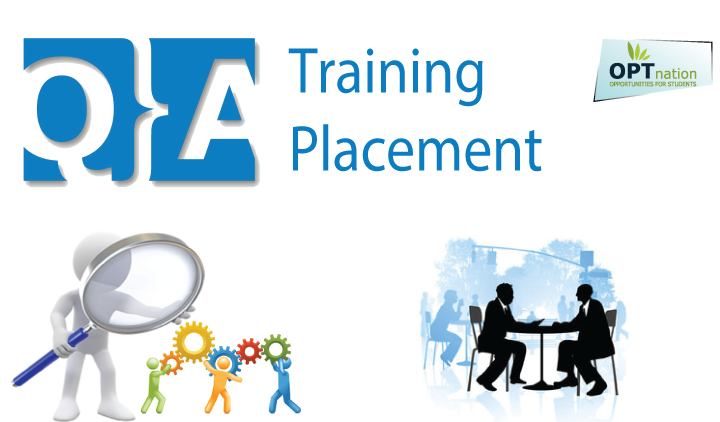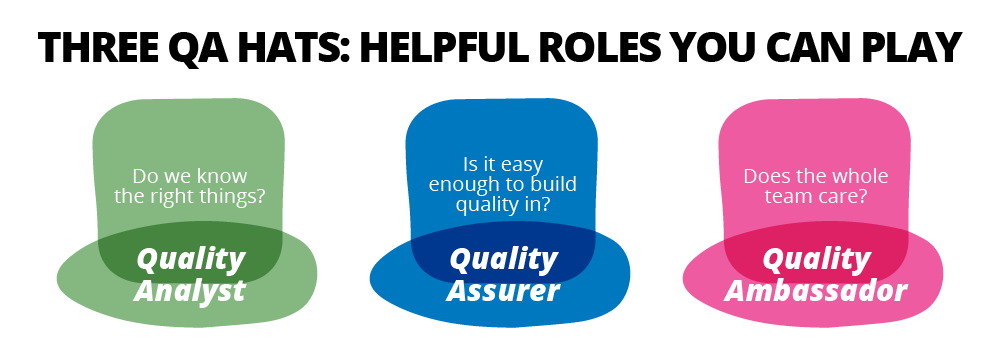❯ What is QA Training?
QA stands for Quality Assurance. It includes activities that ensure the implementation of procedures, processes, and standards in terms to verification of developed software. It focuses on procedures rather than conducting actual testing on the system. It performs process-oriented activities and does preventive activities. It is a subset of STLC (software test life cycle). QA in software development is the continuous monitoring of the SDC (software development cycle) in order to improve the performance and see that the expected results are obtained. QA is crucial to save cost, efforts, time, and the standard of the product. Emphasis is put on tests to find and reporting bugs.
QA certification is the best way to upgrade your career to standards never set before. The biggest organizations are in search for fresh and dynamic QA experts.
❯ Benefits of QA Training
Various advantages of the QA training are as follows.
1. Developing use cases for software based on customer needs
2. High income because of the high demand and significance of the QA professionals in the industry
3. Communicating the complex issues to marketing professionals and software engineers
4. Routine software audits scheduling
5. Implementation of multiple testing methods
6. Resolving the conflicts between competing stakeholders during the QA process
❯ Course Objectives
After the completion of Quality Assurance Training at OPT NATION, you will be able to:
1. Get better knowledge in QA and QC (quality control) procedures
2. Understand the concepts of various teams in a software project, different stakeholders involved and the dynamics of the team
3. Hands-on experience in advance software testing concepts such as creation of test plan, test estimation, test strategy, traceability matrix, etc.
4. Learn the software testing concepts – basic and advanced – overview to automation
5. Understand quality standards, configuration, and risk management topics
6. Automation testing tools and test management tools such as JIRA
7. Understand the basics of SQL
<<Register for QA Training and Placement>>
❯ Who should do this course?
1. Fresh Graduate from college and Looking for career in IT world
2. If you are looking for software testing certification
3. QA professionals interested to polish their skills and knowledge
4. Experienced professionals from any other field and interested to switch their career
❯ Pre-requisites
1. Familiarity with Windows is required.
2. Not necessary but knowledge of programming language will be helpful.
❯ Course Content
Module 1 : Introduction
• Testing concepts
• QA tester
• Roles
• Responsibilities
• Characteristics
• System design
• System specification
• Importance of software testing
Module 2 : SDLC Models
• SDLC
• STLC
• Phases of SDLC
o Planning
o Functional refining of requirements
o Design
o Implementation
o Component test
o Integration and system test
o Alpha test
o Beta test
o Release
o Production
o Ongoing review
o Retirement
• Fish model
• Waterfall model
• V model
• Prototype model
Refer: Importance of taking QA training course by OPT Nation
Module 3 : Testing Strategy
• Creating test plan
• Test scenarios
• Test scripts
• Test summary report
• Test data
• Test execution
Module 4 : Client-Server Architecture
• One tier
• Two tier
• Three tier
• N-tier
Module 5 : Testing Methodology
• BVA – boundary value analysis
• ECP – equivalence class portioning
Module 6 : Levels of Testing
• Unit level testing
• Module testing
• Integration level testing
• System testing
• UAT
Module 7 : Testing Methods
• Conventional testing
• Un-conventional testing
• White-box testing
• Grey-box testing
• Black-box testing
Module 8 : Kinds of Testing
• Sanity testing
• Smoke testing
• Installation testing
• Exploration testing
• Monkey testing
• UAT testing
o Alpha
o Beta
• Static testing
• Dynamic testing
• Regression testing
• Scalability testing
• Security testing
• Compatibility testing
• Forced error testing
• Usability testing
• Reliability testing
• Accessibility testing
• Ad-hoc testing
• End-to-end testing
• Heuristic testing
Module 9 : Defects and Bug Reporting Process
• Difference between defect, bug, and error
• Life cycle of defect
o Severity
o Priority
• Defect resolutions
• Defect management
• Defect tracking
• Defect conflict cycle
• Defect logging details
• Impact analysis
<<Know more about BA Training and Placement>>
Module 10 : Structure Query Language (SQL)
• Database
• RDBMS – relational database management system
• Normalizations
• SQL introduction
• DDL — Data Definition Language
o Create table
o Alter table
o Drop table
• DCL — Data Control Language
• DML — Data Manipulation Language
• Primary and foreign keys
• Constraints
• Sorting
• LIKE conditions
• Operators and Operand
• SQL IN clause
• SQL BETWEEN clause
• SQL VIEWS
Module 11 : Basic Concept of Programming
• Operators
• Variables
• Comparison
• Loops
• If…Else
• Try…Catch
Module 12 : Quality Standards
• CMM levels
• Six sigma
Module 13 : QC – Quality Control
• Introduction to QC
• Modules
o Requirements
o Test lab
o Test plan
o Defects
o Planning and running tests
• QC defects
• QC reports and graphs
Module 14 : QTP – Quick Test Professional
• Introduction to QTP
• Installation
• Recording scripts
• Local and global data tables
• Starting Quick Test
• Quick Test window
• Quick Test window layout
• Using Quick Test commands
• Working with test objects and object repositories
• QTP IDE and different record modes
• Object identification
• Output values
• Data-driven testing
• Regular expressions
• Recovery scenario
• Parameterization
• Descriptive programming
• Transaction points
• AOM – automation object model
o Why automating?
• QC connection
• VB scripting
Module 15 : Load and Performance Testing
• What is load testing
• Types of load testing
• What is performance testing
• Types of performance testing
• Loadrunner
o Introduction
o Architecture
o Installation
o Scripts
o Components
o Why is it required?
• Use of national robot
Module 16 : Database Validations and Schema
• Introduction to database validation
• Techniques
• Database schema introduction
• Tricky techniques in testing
Module 17 : Snagit Tool
• What is Snagit?
• Installation
• Use
You may also Like:
Importance of taking QA training course by OPT Nation
Importance of Training and Placement for OPT Students
❯ FAQs
Who is our instructor?
All our instructors are working professionals from the Industry and have at least 10–12 years of relevant experience in various domains. They are subject matter experts and provide online training so that participants get a great learning experience.
What are the different designations in QA profession?
Some of the popular designations provided/given to the QA professional are QA analyst, test analyst, QA manager, QA director, QA engineer, QA specialist, and QA lead.
What are the roles and responsibilities of a QA professional?
The roles and core responsibilities of a QA professional include the following.
• QA standards development
• QA standards documentation
• Documentation of defects and logs
• Progress and quality documentation
• Test plan development, publishing, and implementation
• Identification of the policies and procedures
• Assistance in case of problem
• Maintaining the project’s scope and quality
Is online learning effective to become an expert on Quality Assurance?
Yes, it is. Various benefits online training provides are as follows.
• Attend the class anytime and from anywhere
• Course material accessible life time
• Immediate doubts clarification
• Experts of the field are your faculty
• Saves time and expense
Do you provide demo sessions?
Although in a live session the number of participants remains limited, we provide demo classes before you enroll. Because our priority is in producing professionals in the Industry, we closely monitor aspects of good teaching and learning, and thus care about your views. So you can attend first two classes for free and then can enroll if satisfied.
What if I miss a class?
If you miss out to attend a class, you need not to worry, because the session automatically gets recorded which you can access form your account. So you can easily attend the missed class anytime and can re-attend the live lecture in the upcoming Batch.
What about the payment?
Debit card, credit card, or Net Banking from all the leading banks – any mode of payment suitable to you is acceptable by us. It is simple and step by step follow up is provided at our site. Also for USD payment, PayPal option is available. Not only this, if you have problem in paying it as bulk, we have EMI option for you.
What if I have more queries?
Our support team is available for you 24*7*365. Your queries will be answered by our experts anytime you need. Even after the completion of the course, you can avail the benefit of re-attending the missed session as you are a lifetime member of OPT NATION.
Do you provide placement assistance?
OPT NATION is the largest online education company and lots of recruitment firms contacts us for our students profiles from time to time. Since there is a big demand for this skill, we help our certified students get connected to prospective employers. But we do not guarantee the placement, as it ultimately depends on your hands-on experience and how diligently you have completed your project work.
How do I get my certificate?
After successful completion of the course and related assignments, exercises and exams, your certificate will be emailed to you.
What if I fail to clear my certification course in first attempt?
You can anytime ask for assistance to your queries and doubts and reappear for the certification exam. Once you have enrolled, you are a lifetime member and so you will be charged nothing for reappearing. Our experts are here to help you out in all possible ways.



